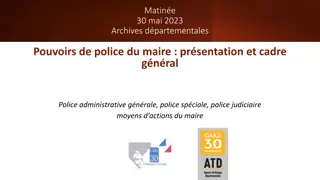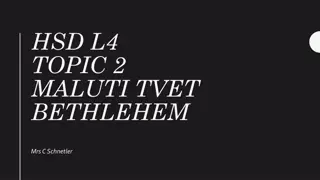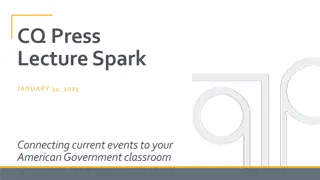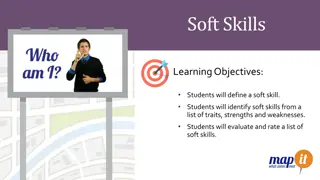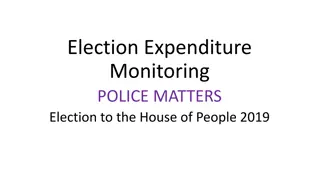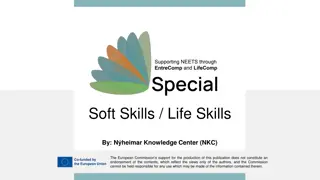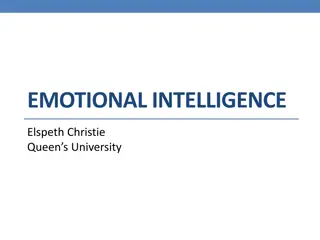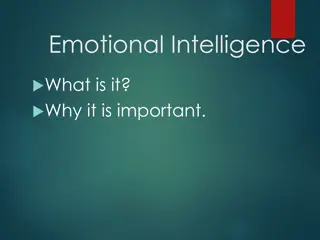Comprehensive Soft Skills & Emotional Intelligence Training for Police Officers
This training module aims to equip police officers with soft skills and emotional intelligence, essential for effective communication, conflict resolution, and professional development in policing. It covers understanding concepts, importance of attitude, behavior impact on communication, conflict differentiation, key components of emotional intelligence, and building professional competencies. Soft skills, defined as interpersonal skills beyond technical knowledge, are crucial for job performance and achieving goals. The content emphasizes the significance of social graces, communication abilities, teamwork, and leadership traits in enhancing relationships and navigating diverse environments.
Download Presentation

Please find below an Image/Link to download the presentation.
The content on the website is provided AS IS for your information and personal use only. It may not be sold, licensed, or shared on other websites without obtaining consent from the author.If you encounter any issues during the download, it is possible that the publisher has removed the file from their server.
You are allowed to download the files provided on this website for personal or commercial use, subject to the condition that they are used lawfully. All files are the property of their respective owners.
The content on the website is provided AS IS for your information and personal use only. It may not be sold, licensed, or shared on other websites without obtaining consent from the author.
E N D
Presentation Transcript
AIM Soft Skills & emotional Intelligence Training
AIM To Develop an understanding of Soft Skills and Intelligence amongst officers and help them in Appreciating these concepts in professional policing. Emotional police the utility of
OBJECTIVES By the end of the Training Module the Trainees would be able to: Understand the Concepts of Soft Skills and Emotional Intelligence Identify the importance of Attitude and how it affects Bheaviour Analyze how behavior impacts Communication and how human transactions take place Develop competency to differentiate between human conflicts through TA List the importance of various Soft Skills applicable for Police Profession Identify key components of Emotional Intelligence Utilize the Emotional Intelligence in building professional competencies.
SOFT SKILLS Soft skills are important job-related skills that involve little or no interaction with machines and whose application on the job is quite generalized.
DEFINITION A definition based on review literature explains soft skills as an umbrella term for skills under key three functional elements people skills, social skills and personal career attributes
SOFT SKILLS Soft skills are a combination of interpersonal skills that enable people to effectively navigate their environment, work well with others, perform well, and achieve their goals with complementing hard skills: people skills, social skills, communication skills, character traits, attitudes, career attributes, social intelligence and emotional intelligence quotients. The Collins English Dictionary defines the term "soft skills" as desirable qualities for certain forms of employment that do not depend on acquired knowledge: they include common sense, the ability to deal with people, and a positive flexible attitude
CONCEPT OF SOFT SKILLS Soft skills are a cluster of productive personality traits that characterize one's relationships in a milieu. These skills can include social graces, communication abilities, language skills, personal habits, cognitive or emotional empathy, time management, teamwork and leadership traits. .
IMPORTANCE OF SOFT SKILLS A study conducted by Harvard University noted that 80% of achievements in career are determined by soft skills and only 20% by hard skills. Experts say soft skills training should begin for a person when they are students, to perform efficiently in their academic environment as well as in their future workplace]A public interest study conducted by McDonald s in UK predicted over half a million people will be held back from job sectors by 2020 due to lack of soft skills.[
TOP TEN SOFT SKILLS FOR DIFFERENT PROFESSIONS Communication oral, speaking capability, written, presenting, listening. Courtesy manners, etiquette, business etiquette, gracious, says please and thank you, respectful. Flexibility adaptability, willing to change, lifelong learner, accepts new things, adjusts, teachable. Integrity honest, ethical, high morals, has personal values, does what s right. Interpersonal skills nice, personable, sense of humor, friendly, nurturing, empathetic, has self-control, patient, sociability, warmth, social skills. Positive attitude optimistic, enthusiastic, encouraging, happy, confident. Professionalism businesslike, well-dressed, appearance, poised. Responsibility accountable, reliable, gets the job done, resourceful, self-disciplined, wants to do well, conscientious, common sense. Teamwork cooperative, gets along with others, agreeable, supportive, helpful, collaborative. Work ethic hard working, willing to work, loyal, initiative, self- motivated, on time, good attendance.
'HARD SKILLS AND SOFT SKILLS 'Hard Skills and Soft Skills Hard skills are specific, teachable abilities that can be defined and measured, such as typing, writing, math, reading and the ability to use software programs. By contrast, soft skills are less tangible and harder to quantify, such as etiquette, getting along with others, listening and engaging in small talk.
Trainee Exercise Group Activity DRAW A LIST OF SOFT SKILLS FOR POLICE
GROUP ACTIVITY LIST OF SOFT SKILLS FOR POLICE LEADERSHIP TEAM WORK SOCIAL SKILLS COMMUNICATION SKILLS PATIENCE UDENR PRESSURE LISTENING SENSITIVE EMOTIONAL INTELLEIGENCE MENTAL BALANCE SAHAJ AUR SAUMYA
LIST OF SOFT SKILLS FOR POLICE POSITIVE ATTITUDE RESPONSIBLE RESPONSIVE FLEXIBLE CONFIDENT COURTESY ACCOUNTABLE TIME MANAGEMENT HONESTY HARDWORK
LIST OF SOFT SKILLS FOR POLICE PERSONALITY TRAITS TO Developed Moral character Transparency Compassionate Motivate Cooperative Collaborative Common sense Positive attitude Prejudice free poorvagrah mukt
LIST OF SOFT SKILLS FOR POLICE Inter personal skills Self discipline Non - Violent Voluntary work attitude Tolerance Negotiation Initiator- pahal lene ki bhawan Competent Adaptable Utsahit samanvayak
LIST OF SOFT SKILLS FOR POLICE Non partisan no favoritism/ non nepotism Vision door darshi Empathy and sympathy Knowledgable/ open to acquire Problem solving skills Critical thinking three sixty degree analysis Vishleshan Physical competencies active Open to take responsibilities Courageous
LIST OF SOFT SKILLS FOR POLICE Soft spoken Resourceful Open minded Believes in equality and justice Non partisan about social and religious issues Secular Non corruptible Swikaryata / acceptability Teachability Vinamrata Prasannachit
LIST OF SOFT SKILLS FOR POLICE Accept conditions of Stress and job related challenges Time management Samajhdar Resourceful Networking and communication Supportive and encouraging Decision maker Good health and fitness Dynamic thought -not static able to change and renew thoughts and actions Spashtwadi- matter of fact Constitutionally conditioned
LIST OF SOFT SKILLS FOR POLICE Jigyasu- wants to learn and imbibe Kannoni drishtikon viksit Adarshon ideals ke prati nishthawan Sidhantwadi Turst worthy Conceptual clarity udheshya ki spashtata Janonmukhi Prajatantrik vichar aur moolya Kam main ruchi aur utsah- kam ke parti skaratmak bhav Manobal uper
LIST OF SOFT SKILLS FOR POLICE Understand bodylanguage Swayam ki galti ko smajh kar sudhar karna Dosron ki galti ko maaf karne ki kshamata/ forgiveness Nishkam, nirlipt, nisprahi Manoviagyanik soch aur mansikta Badappan Samanvaykari- without ego Faithful Good planner Samanta samdrishti straightforward
LIST OF SOFT SKILLS FOR POLICE Devotion to duty Realistic Stress management Emotional intelligence Rationality and tarkik budhi Counseling Interviewing skills Interrogation Humanity Advisory skills/ mentoring skills Language skills related to job responsibility
LIST OF SOFT SKILLS FOR POLICE Social awareness of the area- social intelligence Local Culture, norms and its awareness- social intelligence Human psychology Observation skills Delegation and coordination Work distribution and management Approachable/ accessible Creative and innovative Crowd management Understanding other peoples emotions
FUTURE GOALS WORK ON YOUR SOFT SKILLS Be Aware of your performance in the police is evaluated by your people interface People interface is dependent on self management Self is a subject to be managed by SOFT SKILLS


